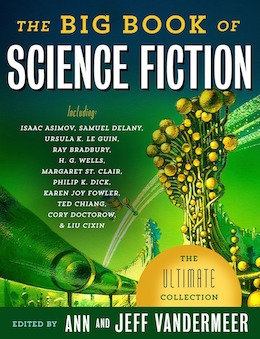The editorial duo of Jeff and Ann VanderMeer have produced several stellar collections and anthologies in recent years. The pair show a distinct skill in creating themed retrospectives; their feminist science fiction project, Sisters of the Revolution, is one such contribution to the field that jumps to mind. This time around, they’ve taken on a much larger task: a retrospective of the twentieth century in science fiction, defined broadly and with enthusiasm.
There are several compendiums of science fiction out there—the Wesleyan and Norton anthologies, respectively, are oft-cited and regularly used as benchmarks of “the genre” in short fiction. However, The Big Book of Science Fiction: The Ultimate Collection is a strong contender to displace those thanks to its broad scope, its international inclusiveness, and its academic eye to context and confluence. Vintage Books is producing the massive but affordable tome—and compared to the high price point of retrospectives from academic presses, that’s a significant bonus.
Because this collection is—pardon my language—absolutely fucking huge, this review addresses the project itself and the work done therein rather than specific stories. Addressing the stories would require a small book’s worth of space, and while that’s a worthy and interesting undertaking, given the depth and breadth of fiction the VanderMeers have included in The Big Book of Science Fiction, someone else can tackle it.
In their introduction, the VanderMeers offer their definition of “science fiction,” a definition no collection like this can avoid giving, and it is as broad as it is possible for a category to be: science fiction “depicts the future, whether in a stylized or realistic manner.” Or, to be more succinct, “science fiction lives in the future.” This broadness of definition is further expanded by their explicit interest in refusing the barriers of high/low culture in their reach. They also make a specific effort to include and contextualize different traditions of fiction that inform the “sf” category as well.
Those three specific points of argument—broadness of definition, refusal of divisions based on cultural capitol, and inclusion of relevant international threads of fiction—make for a stunning and satisfying retrospective. It’s perhaps the most engaging of these I’ve encountered to date, because it has fiction to show me and perspectives to consider that I had not encountered before. I cannot stress enough the sense, after spending long years in the academy studying sf, that even stories from the past that were technically new to me would fit logically into paradigms I already knew. These stories, though, sometimes veer off into other directions.
And I adored that with a real fervor.
The simple refusal to follow black-and-white patterns and accepted narratives defining the genre gives the editors so much room to explore—and to build a look at the twentieth century in science fiction that is sharply unique. At the end of the introduction, the editors delineate simply their own selection processes, including a focus on more complete genealogies and bringing together both the fringes and the rifts in the history of the genre. This is a complex and fantastic project—one I think they’ve succeeded admirably at to make an academically useful and pleasurably readable collection. They also acknowledge that there are traditions of science fiction not represented here, limitations as a result of translation difficulties or inability to access material–so I appreciate that, too.
There’s also something to be said about the structure/organization of the text. The second piece in the collection, for example, is by Rokheya Shekhawat Hossein (“Sultana’s Dream”)—a Bengali writer who worked extensively in her lifetime (1880-1932) for the education of women. Each piece in the collection is preceded by a brief write-up of the author, their life’s work, and their story in the context of the world and genre alike. While each introduction is short, the inclusion of them enhances the stories immensely; since this is a historical retrospective, the authors’ lives are more important to the context than one might assume. I appreciated the effort to add depth and resonance to the structure of the collection, and to give the readers more information to work with on authors that are likely unfamiliar to them.
There are classics here—for example, Leslie F. Stone’s “The Conquest of Gola”—that I’ve seen in most of these types of collections, but there are also new classics, stories that seem strikingly necessary to a rich understanding of the field but have not been previously collected or acknowledged as part of the canon. To balance those two urges is a high end goal, and to my eye, the VanderMeer duo have succeeded at the project. This is a worthwhile book, and a definite positive addition to a reader or academic’s collection. It’s handsome, huge, and amazingly well-curated; our editors, here, have done a fabulous job.
I couldn’t ask for more, truly. It’s diverse, wide-ranging, engaging, and fun; the stories are introduced well, juxtaposed better, and the overall effect is one of dizzying complexity and depth. While it likely isn’t the sort of book you’ll read all at once—unless you’re very very dedicated—it’s an excellent reference, or a book to come to for a story or two at a time. Certainly, though, a solid read and a solid purchase for old hands and new faces in the genre alike.
The Big Book of Science Fiction: The Ultimate Collection is available now from Vintage Books.
Lee Mandelo is a writer, critic, and editor whose primary fields of interest are speculative fiction and queer literature, especially when the two coincide. They have two books out, Beyond Binary: Genderqueer and Sexually Fluid Speculative Fiction and We Wuz Pushed: On Joanna Russ and Radical Truth-telling, and in the past have edited for publications like Strange Horizons Magazine. Other work has been featured in magazines such as Stone Telling, Clarkesworld, Apex, and Ideomancer.










